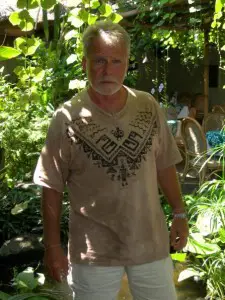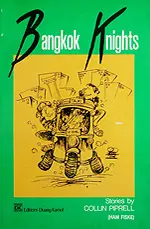 Collin Piprell is a Bangkok-based Canadian writer, author of several books about Thailand: Bangkok Knights, Bangkok Old Hand, Yawn, and Kicking Dogs. He has been living and writing in Thailand since 1984. In this interview he talks about his books, life in Thailand, the publishing industry and blogging.
Collin Piprell is a Bangkok-based Canadian writer, author of several books about Thailand: Bangkok Knights, Bangkok Old Hand, Yawn, and Kicking Dogs. He has been living and writing in Thailand since 1984. In this interview he talks about his books, life in Thailand, the publishing industry and blogging.
Voicu Mihnea Simandan: Your first collection of Thailand-based stories, Bangkok Knights, has seen three editions. What made the book so popular?
Collin Piprell: The characters come across as real people, and we find them in affecting situations, even sad ones, that are at the same time really funny. And the book appeals to both men and women readers.
Bangkok Knights isn’t a bargirl book, even though the review on your blog suggests it is. There are bargirls in it, but it also features ‘polite’ Thai women and Western women. If anything, the female characters are the strongest, most adult personalities in these stories. The men tend to be perennial adolescents.
Some people believe Knights is just a collection of anecdotes, true accounts of my life here. I’ve had people ask me about how to find the Cheri Tone Guesthouse, for example, or Boon Doc’s Bar. But it’s all fiction. Everything—characters, venues and situations—is fictional. Of course I’ve had to draw on personal experiences, and the characters are in part composites of real people, but they’ve been imaginatively reworked. That’s what fiction is, I think.
Someone once took exception to my claim I’d never been robbed. “What are you talking about?” he said with some heat. “What about that story set on the Maekok River?” It took me a moment to realize he was talking about a chapter in Knights. It’s actually flattering to think anyone would assume this is all reportage of real people and real events.
 VMS: While reading Bangkok Knights, I couldn’t help noticing that the stories are interrelated, although they are stand alone narratives. Was did pre-planned or did the characters just take over the book?
VMS: While reading Bangkok Knights, I couldn’t help noticing that the stories are interrelated, although they are stand alone narratives. Was did pre-planned or did the characters just take over the book?
CP: I had already written and published most of the shorter stories in places like the old Bangkok Post Sunday magazine. I imagined my readership as a bunch of beery, bleary Western men in need of a laugh with their Sunday breakfasts.
I kept getting suggestions I collect them in a book, but I didn’t think there were enough of them, or that they were good enough in themselves. So I brainstormed the elements of what turned out to be a series of much longer stories—my personal favorites, especially the concluding story. In the process of writing them, I drew on the same characters again and again. Meanwhile, the always anonymous first-person narrator (not me)—the ironic old-hand observer—is progressively revealed as being at least as screwed up as any of the other men he describes.
So I wound up with something that was neither novel nor collection of stories, precisely. There is story and character development across the chapters, and it feels like a whole. The last publisher wanted to promote it as a novel, and asked me to make a few changes to make it such. I caved in on some of the suggestions; the only one I regret is changing the conclusion—the original was much better, and any new edition will revert to that one.
VMS: Many (if not all) English-language publishers operating from Thailand claim that only books about go-go bar girls and prison life sell. Do you really think English-language readers (tourists and residents alike) expect only such books from the expat writers living in Thailand?
CP: Just as there is a class of writers that do appear to write bargirl stories exclusively, there are a class of readers who expect (and seem to want) nothing else from a Bangkok writer. Another class of reader stereotypes Western expat writers along these lines without even reading their books. That’s a pity.
The local fiction publishing industry is pretty parochial. Before Asia Books stopped publishing fiction, they wanted every novel or collection of stories to have “Bangkok” plastered somewhere on the cover. DK Books was the same. They imagined, maybe correctly—I’m no marketing expert—that their market consisted entirely of men in need of bargirl books or else tourists in need of information. I could be wrong, but I reckon this was unfair to both writers and readers.
VMS: How were your other books of fiction received?
CP: Kicking Dogs has enjoyed a long life, and has been received very well both here and overseas, judging by reactions I’ve had. (I’ve recently made it available as a Kindle e-book and Amazon print-on-demand, but I’d be happy if a mainstream publisher would like to consider a new edition.) In my opinion, it’s the best of my three Thailand-based novels.
Yawn has its champions, but I don’t think it’s been as successful as its two predecessors. The middle of the book may be too long and slow-moving, for one thing. If it’s ever published again, I’ll trim the fat first.
MOM is the best thing I’ve ever written, but I’m still in the process of finding out how it’s going to be broadly received. (Most early readers love it; some find it confusing or simply not to their tastes.) A virtual Bangkok does appear as a minor setting, and some of the action takes place in what was Thailand’s eastern seaboard 50 years in the future, but it’s mostly unrecognizable as such (as is the other main setting—the US eastern seaboard, roughly where NY City used to be). It isn’t aimed at a local readership or market.
VMS: Asia Books no longer publishes new titles, concentrating on retails and distribution only. How difficult is it nowadays to have a novel published?
CP: I don’t know of any publisher doing fiction here in Thailand now. Internationally, it’s a hard market, if you aren’t already established. The publishing industry is undergoing a revolution, and even insiders can’t be sure what’s emerging. A whole constellation of mostly digital technology-related factors are changing everything from reading habits to the ease (at least in technical terms) of writing, laying out, publishing and promoting books.
VMS: What is your writing routine?
CP: I work both at home and in various coffee shops and other places around town. In the early morning, I like to take a clipboard and a pot of tea out on my balcony and write long hand. Later in the day, as a break from my office, I’ll sometimes take some pages of printed manuscript outside for a change of venue.
When the Muse is with me, I like to write for the first several hours of the day, and then devote the remainder to lunches with friends, reading, and so on. Sometimes, however, other things take me over for days or weeks at a time. The Muse, who is easily offended, then buggers off and, by the time I’m ready to fall back into a proper writing routine, she needs seducing all over again, and this can take days.
Non-routine: I spent long days in a freezing cabin in the mountains of Japan finishing a draft of MOM, and nine weeks on a derelict yacht between Israel and Phuket doing the same with Yawn, except that I had a variety of duties to attend to on the boat, so it was harder.
VMS: What’s your take on the expat writing community from Thailand?
CP: I know some very talented writers who live here. A few are even earning good incomes internationally. Some of them I enjoy reading, others I don’t, which is probably only a reflection of my tastes, rather than their work. A lot of them I haven’t read.
Could it be that I have myself fallen victim to one of the stereotypes I mentioned earlier? I tend to find both bargirl-type bars and books about them tedious. But no one should ever say a writer shouldn’t write about this thing or that one, or set a book here or there. A good writer can write a good story, even a brilliant one, about anything, and set it anywhere. God preserve us from PC thought police who would define what’s permissible literary territory.
VMS: You are actively promoting your books on your personal blog. How important is it for a writer to have a “good presence” on the internet?
CP: Judging by the buzz among agents and publishers, nearly all writers, in this new digital age, will be expected to do much of their own promotion. A blog/website, it seems, is the minimum ante.
But writing novels should be a full-time pursuit. It’s already difficult if a writer has to do other things to earn an income while writing fiction. If they also have to blog and network and so on, it’s hard to see how they’ll ever find time to write anything of quality.
VMS: Surprisingly, your latest novel, is a science fiction book. Give us a few details.
CP: Finding I’d embarked on a science-fiction trilogy was certainly a surprise to me. But I don’t see that it should be surprising to anyone else. Pardon me if I suggest you might be falling victim to this tendency to stereotype Bangkok-based writers. Why shouldn’t a writer write about anything at all? And why can’t one and the same writer be capable of writing in a number of styles and genres?
Just a note: Unfortunately, from a marketing point of view, MOM and its sequel aren’t genre sci-fi novels.
VMS: What is the importance of humour in your fiction?
CP: So far, nearly all of my fiction is humorous. Even the post-apocalyptic stuff is darkly comic. Existence itself can seem pretty dark, when you think about it, and laughter is our main defense against an absurd and often cruel Fate.
VMS: What are you working on right now?
CP: I’m much of the way through a sequel to MOM. If I enjoy any success with these two books, there’s a third novel to follow. I have other books in various states of disrepair waiting, both fiction and non-fiction. A lot of people have suggested I write more thrillers starring Jack Shackaway in the Kicking Dogs vein. And I do have a couple of these stories partly written. (They’ve been lying fallow for years, but I’d like to return to them at some point.)
VMS: Thank you for your time. I’m looking forward to reading your next Thailand book.
CP: Thanks for considering my books. And I’d like to wish you the best with your own writing. The Buddha Head synopsis promises a gripping thriller.
Voicu Mihnea Simandan
Bangkok, Thailand
July 17, 2010


Great interview. Silkworm Books in Chiang Mai publishes a few novels, but not many and Monsoon Books in Singapore publishes novels set in Thailand as well. But as you mentioned the publishing landscape is drastically changing..